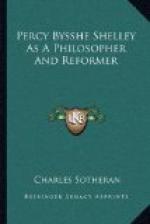“I curse thee, though
I hate thee not. O slave!
If
thou could’st quench the earth consuming hell
Of which thou art a
demon, on thy grave
This
curse should be a blessing. Fare thee well.”
Sad as it is to contemplate any human being in his agony making use of such language to another; and however much we may sympathize with the poet, yet we cannot but have inwardly a feeling of rejoicing; for, if it had not been for this unheard of villainy, we should probably never have had the other magnificent poetry and prose of Percy Bysshe Shelley composed during his self-imposed ostracism, and which furnish such glorious thoughts for the philosopher, and keen trenchant weapons for the reformer.
Have any of my hearers ever stood, in the calm of a summer evening, in Shelley’s native land, listening to the lovely warble of the nightingale, making earth joyful with its unpremeditated strains, and the woods re-echo with its melody? Or gazed upwards with anxious ken towards the skylark careering in the “blue ether,” far above this sublunary sphere of gross, sensual earth, there straining after immortality, and
“Like
a poet hidden,
In
the light of thought,
Singing
hymns unbidden,
Till
the world is wrought
To sympathy with hopes and
fears, it heeded not,”
pouring out such bursts of song as to make one almost worship and credit the fables, taught in childhood at our mothers’ knees, of the angelic symphonies of heavenly choirs. Such was the poetry of Shelley; and as the music of the nightingale or the skylark is far exceeding in excellence that of the other members of the feathered kingdom, so does Shelley rank as a poet far above all other poets, making even the poet of nature, the great Wordsworth himself, confess that Shelley was indeed the master of harmonious verse in our modern literature. It is broadly laid down in the Marvinian theory that all poets are insane. I would much like to break a lance with the learned Professor of Psychology and Medical Jurisprudence; but as the overthrow of this dogma does not come within the scope of my essay, I would suggest to those who may have been influenced by that paper to read Shelley’s “Defence of Poetry.” I shall quote two extracts therefrom, each pertinent to my subject. The first describes the function of the poet:
“But poets, or those who imagine and express this indestructible order, are not only the authors of language and of music, of the dance, and architecture, and statuary, and painting; they are the institutors of laws, and the founders of civil society, and the inventors of the arts of life, and the teachers, who draw into a certain propinquity with the beautiful and the true, that partial apprehension of the agencies of the invisible world, which is called religion.”
The other is in extension of the same idea, and concludes the essay:




